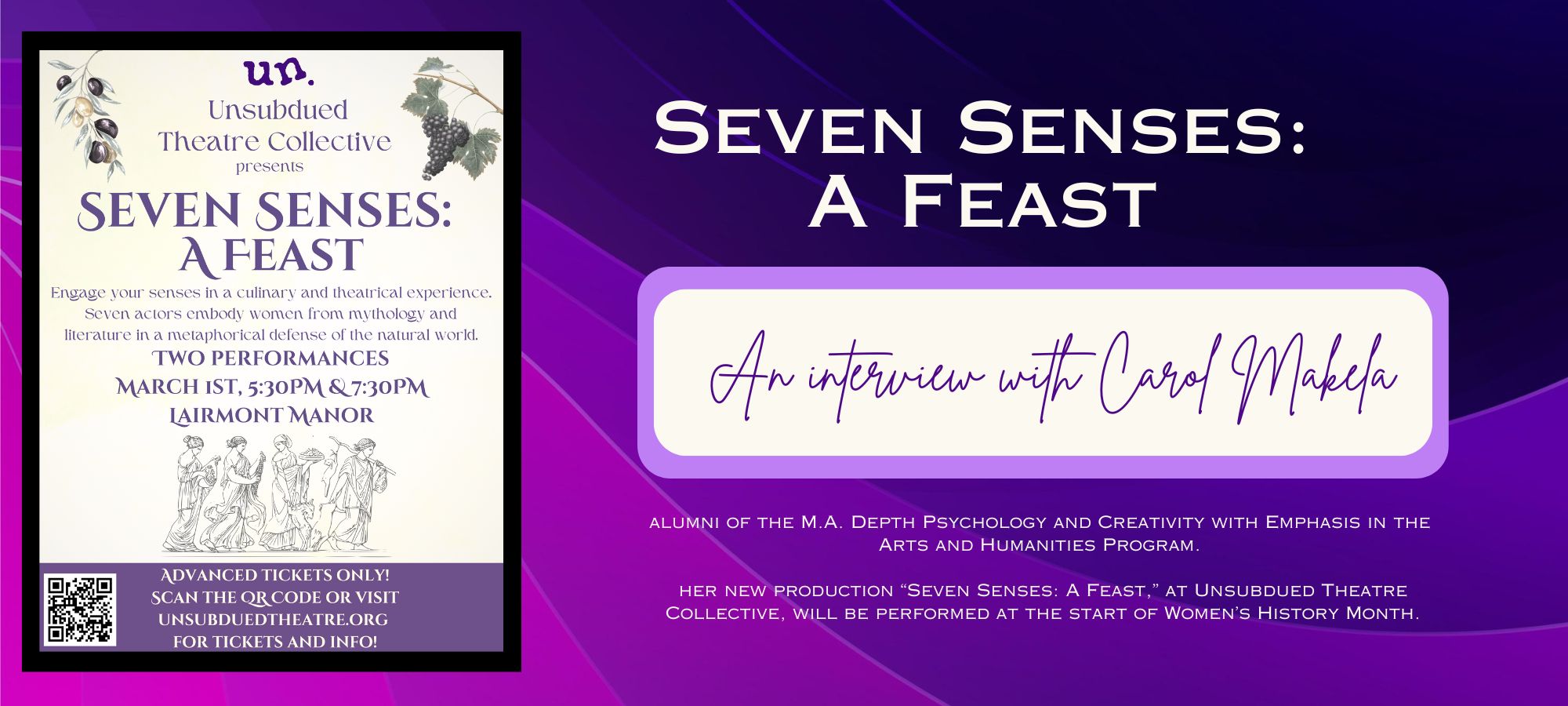Carol Makela is a teacher and performing artist, as well as an alumni of the M.A. Depth Psychology and Creativity with Emphasis in the Arts and Humanities Program. I’m delighted to speak with her about her career in the performing arts and her new production “Seven Senses: A Feast,” at Unsubdued Theatre Collective that will be performed in two showings on March 1, the start of Women’s History Month.
Angela Borda: It’s lovely to be speaking with you today, Carol. Can you begin by telling us a little about your background, how you came to Pacifica, and what you did for your M.A. project with us?
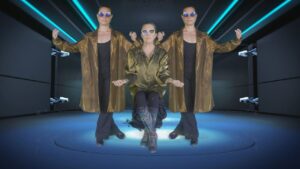
Carol Makela: I was trained in classical ballet from a young age and went on to perform in regional ballet companies. I was also always drawn to the world of books and ideas and have been an avid writer since before I can remember. In my mid-20’s I felt drawn to the intellectual life and wanted to enroll in college. Having very limited financial resources, I worked for several years as a dancer in Vegas-style shows, some international, as a way to save money for college. I completed a BA in History and Spanish, with the intention of following up with a master’s and eventually a doctorate in Latin American Studies. Life threw a curveball and I got married and had two children, and put everything else on hold. After seven years of unsatisfying domesticity, I initiated a divorce and re-enrolled in college to obtain an elementary teaching certification. Once my kids were old enough, I auditioned for my first theatrical production with a local community theater and have been hooked ever since. I started a Theatre Arts program in the school where I teach which has become enormously popular, and I continue to create performing art within my community. When Covid hit the world and I found my creative options limited, I enrolled in the Depth Psychology and Creativity program at Pacifica. Every nuance of the program description spoke to my soul. I found myself creating completely different genres of art for each course project, things I’d never dared try before. I became courageous and deeply inspired. My final MA project, which I titled “The Art of Teaching at the End of the World,” explores education and calls for the inclusion of Ritual, Art, Play and Storytelling as vital elements of children’s educational experience. I intentionally implement these elements in my own teaching and advocate for other teachers to do the same.
Angela: What is the intersection of dance and depth psychology for you and did studying at Pacifica impact your way of performing or thinking about your craft?
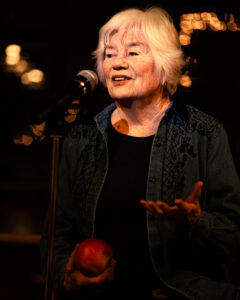
Carol: What has transformed in my work with dance, and writing, and the performing arts in general, is the capacity to be guided by intuition. I used to be rather insecure when coming up with choreography or blocking scenes in theatre productions. By tapping into the creative unconscious I now let myself trust in the process and am usually pleased, and often surprised, at what bubbles up. When I’m getting ready to create, it has become a ritual of mine to take a slow, solitary walk in the nearby forest and ask the trees to whisper their ideas to me. I know that one does not tap into creativity in a vacuum – rather I expand my awareness, creating space for inspiration to arise. This is perhaps the most profound outcome from my studies in depth psychology and creativity at Pacifica.
Angela: Your performing arts experience is so eclectic, from Cornish dance in Seattle to ballet in Indiana and Kentucky, Vegas-style shows in Asia, a musical version of Bill & Ted’s Excellent Adventure, and now writer, director, choreographer, and actor at Unsubdued Theatre Collective. Has there been an evolution in your performances? What stands out as a highlight for you?
Carol: What stands out is a performance art piece I co-created with a writer-musician friend back in 2016, which we performed as part of an adjudicated show called “12 Minutes Max.” This was the first time I’d ever collaborated closely with someone, and the energy and spark between us was immediate and transformational. My friend, a classical pianist, wrote a monologue that he set to very discordant music, to which I incorporated spoken word and dance. We found that what we ultimately created was deeper and richer than anything we could have created independently.
Angela: Aside from being a dancer and performing artist, you are also a teacher of 20+ years, teaching Spanish and dance & theater. I’m sure you’ve had some students who went on to become professional dancers and performers, but I’m guessing the majority of students do not. Perhaps I’m speaking as a person who elected to take jazz dance in high school in order to get out of regular p.e. classes! But I’m wondering, from a somatic and psyche perspective, what impact do you see on your students who aren’t destined for the Bolshoi, but are nonetheless engaged in this artform?
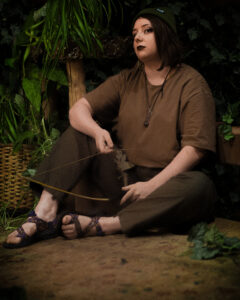
Carol: The impact on students is enormous. I’ve had parents tell me that their kids’ involvement in my classes has created a safe place in their thinking of how they belong in this world; how it has been a huge boost for self-confidence; how kids struggling with dyslexia have become readers. From a somatic and psyche perspective, I strive to create a space where kids are encouraged to tap into their talents and interests and uncover parts of themselves they might be unaware of. I sometimes do intentionally creative casting so young people can explore aspects of themselves that are not “on the surface,” so they can dig deeper and learn more about themselves and their inner lives. I engage students in improv games to help them get out of the “rational mind” and begin to trust their intuition. I constantly stress the collaborative aspect of theatre and encourage taking creative risks.
Angela: You are one of the original members of Unsubdued Theatre Collective. How did this come together and what kinds of events do you put on? What’s it like working in an environment dedicated to “democratic, collaborative, and transparent processes”?
Carol: I am one of several artists who work collaboratively in the Unsubdued Theatre Collective. The collective was an inspiration by a local actor & playwright who wanted to create a space where artists are free to engage in their craft without the “top-down” hierarchy found in most theatre companies. We put on Revue-style shows, full length plays, and staged readings. What I most appreciate about working with the Unsubdued is the opportunity to try out any and all aspects of theatre – writing, directing, acting, choreographing, producing original shows. It is the perfect vessel for my creative energies at this time and place in my life.
Angela: You have a new show, “Seven Senses: A Feast,” at Unsubdued Theatre Collective that will be performed in two showings on March 1, the start of Women’s History Month, in which “seven actors portray women from mythology and literature through monologue, poetry and song. The underlying theme of each performance piece is the protection of the natural world – forests, oceans, climate, feminism and humanity.” Tell us about the show and where you found inspiration for it.
Carol: The inspiration for my Seven Senses show came from a course taught by Carol Burbank at Pacifica Graduate Institute in 2021. In this class we read about Judy Chicago’s famous exhibition, The Dinner Party, in which the artist collaborated with others to invite silenced voices to the table, intimately portrayed, that would reach through and beyond the senses. For my final project I created a culinary feast inspired by Sappho to accompany my academic paper. The idea remained alive in my psyche, and this past summer I followed my intuition and reached out to several women playwrights to see if they would be interested in collaborating with me.
Angela: Was it your intention to celebrate Women’s History Month with this production? The show is described as “an evening of food, drink, art, and feminism,” so I gather that feminism is a crucial element to your performing life and artistic viewpoint.
Carol: Feminism is certainly important to me. I wanted to put a different kind of spin on female characters from mythology and literature – to bring them into the modern day and discover what they might have to say. The timing worked out perfectly to present the show on the first day of Women’s History Month. All the playwrights and actors are women, and the venue, a historical landmark in Bellingham, WA, is managed by women. It seemed important to elevate women’s voices in a powerful and positive way, while tying them all together with an underlying theme of protecting and fighting for the natural world.
Angela: What has it been like putting the show together and rehearsing it? What are you most excited for in the performance?
Carol: The most important and exciting aspect of putting the show together has been the element of collaboration. I invited the playwrights to choose women from mythology and literature who spoke to them personally, and the actors to rely on their intuition in bringing the characters to life. I see my role as one who weaves all these pieces together into a coherent whole. It has also been exciting, and challenging, to devise the culinary elements so they align with each performance art piece.
Angela: Best of luck with “Seven Senses: A Feast”! And I look forward to seeing what performances and productions lie in your future.
The Unsubdued Theatre Collective and more information about “Seven Senses: A Feast” can be found here.
For more information about the M.A. Depth Psychology and Creativity with Emphasis in the Arts and Humanities Program, visit us here.
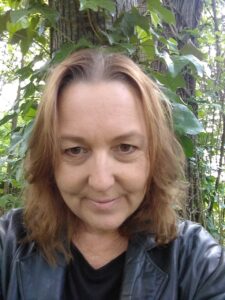
Carol Makela is a parent, educator and performing artist. She teaches Spanish and Theatre for children grades K-9 at the Bellingham Family Partnership Program and is involved in local theatre as an actor, dancer, choreographer, director, and playwright of original works.

Angela Borda is a writer for Pacifica Graduate Institute, as well as the editor of the Santa Barbara Literary Journal. Her work has been published in Food & Home, Peregrine, Hurricanes & Swan Songs, Delirium Corridor, Still Arts Quarterly, Danse Macabre, and is forthcoming in The Tertiary Lodger and Running Wild Anthology of Stories, Vol. 5.

